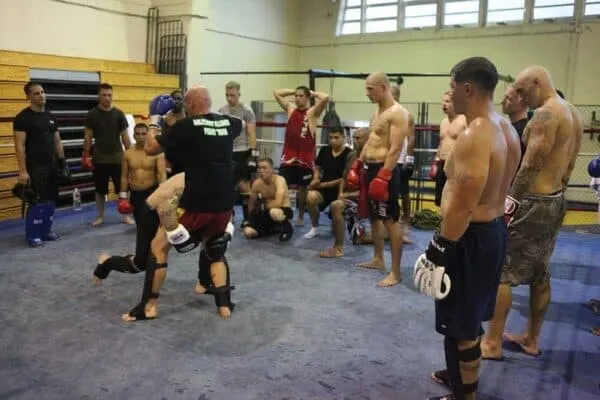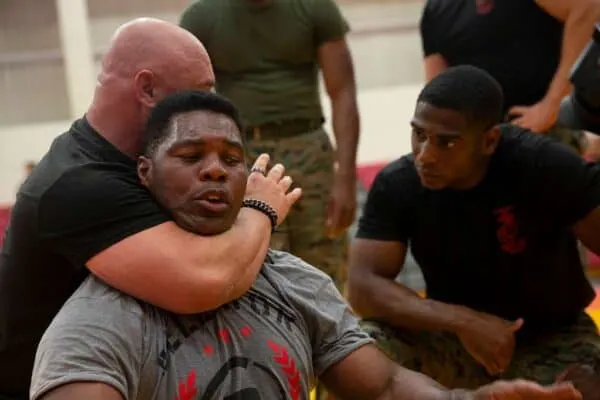
Mixed martial arts, or MMA, is all the rage now. It’s the fastest growing sport in the world with the premier organization in the UFC being extremely popular as well as profitable. However, competition aside, MMA is extremely rewarding to learn even for the everyday citizen.
Learning MMA is difficult because you have to learn all aspects of the art of fighting. For example, mixed martial arts (MMA) incorporates both stand-up and ground fighting, requiring years of hard work, discipline, and dedication to become proficient in MMA.
As you see it’s not a walk in the park to learn MMA. In this article, I will explain various reasons why MMA is hard to learn as well as provide general tips about starting MMA and answering frequently asked questions.
Is MMA Hard to Learn?
So to answer the main question right off the bat, yes, MMA is hard to learn. Or rather, it’s not easy to learn is a better way of saying it. This is because unlike other martial arts like boxing, judo or karate where you’re learning just one art and one art alone, with MMA, you’re learning a wide variety of arts, sometimes at the same time.
With striking, you have to learn boxing, kickboxing and Muay Thai. Not to mention, there’s the ground game with wrestling, grappling and jiu-jitsu. And let’s not forget clinching and overall conditioning.
Very few UFC fighters today start off “learning MMA” or combining a number of arts. There are some exceptions, but overall, most prominent fighters have a base usually consisting of boxing, wrestling or jiu-jitsu. That means it can be difficult even for the professionals who have to incorporate various arts that they previously never trained in. It is also why an MMA fight is viewed as a “true” or “real” fight compared to boxing for example — because you’re truly in a fight that utilizes all facets of combat arts.
How long does it take to learn MMA?
How long it takes to learn MMA is somewhat difficult to answer. To reach a proficient level depends on a number of factors:
Athletic ability
There’s a reason a number of athletes from other sports tend to venture into mixed martial arts and find success. The more athletic one is, the more flexible, durable and strong they are. Not to mention, their fitness and cardio will already be at a high level. The end result is that picking up MMA is a lot easier than, say, someone just getting off the couch and looking to gain muscle mass or lose weight.
Time spent per week
Like any hobby or pursuit, it requires time and dedication, and the same applies to MMA. To truly master the craft, one must spend anywhere from a thousand to ten thousand hours, though, this also depends on the fighter. That is why the more hours one spends on a weekly basis, the higher their level will eventually be. Today, most of the top MMA fighters not only train almost every day, but many of them also train two to sometimes three times a day with breaks in between.
Prior martial arts experience
As aforementioned, many MMA fighters today train in MMA having had some form of prior martial experience. Whether it’s jiu-jitsu, boxing, wrestling, judo or karate, having some experience can go a long way in learning MMA as you’ve already covered one facet of the sport in some form. Whatever art this is, can also be combined with multiple other arts and help one achieve a higher level much quicker. That is why it can take a pure boxer much less time to master MMA than someone just starting the sport with no combat sports expertise.
With all that said, there’s no way one can truly learn MMA. After all, even the top fighters today continue to learn new things every day and evolve with each fight. It’s not like the pound-for-pound best fighters are taking care of everyone in sparring or in the gym. They are also getting beat up by their training partners because that’s the only way one can grow in MMA.
Can you start MMA with no martial arts background?
Beginners with no prior martial arts or combat sports experience can certainly learn MMA. After all, everyone started somewhere and there are cases of successful fighters today who started training with no prior experience. Of course, one would need to train in other areas to be successful in MMA such as improving their strength, endurance and cardio. But that will come in time as one trains on a regular basis.
Speaking of training, there are multiple MMA gyms around the world with instructors specialized in training beginners. The basics and fundamentals will all be taught until you’re ready to progress to more advanced classes, drills and skills.

As for how long it takes to become an MMA fighter? Again, this depends on the level of the person training in MMA and whether they are willing to step in as soon as possible. The logical step is to take part in some amateur fights first. However, there are a number of cases of individuals turning professional as little as one year into their MMA journey. On the other hand, for some, it could take two to three years to become a professional MMA fighter.
Is MMA a good sport for kids?
There is no age limit for MMA. Just like someone in their fifties can start learning MMA, a child can also start training in MMA. The ideal age to start MMA for children? Ideally between the ages of 12 to 15 as this is when they become adolescents and they start exhibiting bodily changes. However, there are examples of kids training as young as the age of five, particularly in countries like Brazil, Japan and Thailand.
With that said, most children start off with one martial art rather than MMA together. In general, it’s good for kids to start learning arts like judo, karate or wrestling as this not only keeps them active, but also helps build motivation, instill discipline and provides them with self-defense skills at a young age. If they are showing a genuine interest in going up a level, they can certainly transition to MMA training later on.
LEARN MORE Check out our article on Will Martial Art Make My Child More Aggressive?
Can you do MMA without fighting?
You can certainly train in MMA without fighting at an amateur or professional level. There are a number of MMA students who train for a number of reasons. For some, they just want a hobby. For others, they want to be part of a community and make friends with fellow students training in MMA. Some want to do it to get in shape or lose weight while there are also some who train in it for self-defense purposes.
Those who don’t compete can also take their MMA skills to the next level and potentially become coaches in the future, whether it’s at an accredited gym or if they want to start their own MMA gym. There is no hard and fast rule that if you train MMA, you have to compete against others. You can certainly have a go if you truly want to test yourself, especially with amateur fights, but most times, a good sparring session is more than enough.
Is MMA harder than Boxing?
MMA is most definitely harder to learn and train than boxing. This is because in boxing, you only have to worry about two weapons in the form of your opponent’s left and right hand. There are other aspects to boxing such as the clinch game and overall endurance, stamina and conditioning. But it’s still nothing compared to MMA where you’re using virtually every part of your body as a weapon from your elbows, knees, legs, heels and more.
And because you are focused on multiple arts at once compared to just boxing, this can also be extremely tiring for someone who has solely trained in boxing. It’s also one of the reasons why we rarely see boxers take on MMA fighters in MMA fights. The simple answer is they wouldn’t win 99% of the time because they lack the weapons and overall skills of an MMA fighter.
LEARN MORE Check out our extensive MMA vs. Boxing: Which Is Harder To Learn? (Best Explained)
How often should I train in MMA?
As aforementioned, professional MMA fighters train anywhere from five to seven days a week, sometimes multiple times a day. Obviously, this doesn’t have to be the case for everyone as it all depends on their level and what they want to achieve. If you’re looking to MMA as a simple hobby, you can train once or twice a week.
However, if you want to make significant progress and evolve, it is recommended to go at least three times a week. This will also help you get adjusted to the physicality and eventual soreness you’ll experience with MMA training sessions which will be much more intense than other sports.
Is MMA effective in a street fight?
MMA is certainly useful and effective in a street fight. Now, one should keep in mind that if one is faced with dirty tactics such as low blows or eye-gouging, that’s a different story. But overall, being versed in MMA is very helpful if you find yourself in a one-on-one street fight. After all, Brazilian jiu-jitsu is regarded as the best art to learn for self-defense and it’s a huge part of MMA. Add in the training from boxing and kickboxing, and you’ll be well equipped if you find yourself in a street fight.
LEARN MORE Get the full report on Does MMA Work In a Street Fight?
How Dangerous is MMA?
Much like any contact sport, MMA is not without its dangers. When one trains in MMA, they are prone to a number of injuries from sprains, ligament tears, broken bones to even concussions. But with that said, the same applies to sports that are seen as less harmful such as football or basketball. Injuries are part of every sport and can happen in the ways you least expect, even if you are training or sparring with the utmost caution.
LEARN MORE Still curious? Click here to learn about How Dangerous is MMA Fighting? Here’s a Closer Look
How much do MMA gyms cost?
The average cost to train for MMA varies depending on a number of factors. Among them are your location and whether you’re in a metropolitan or suburban city. Just like with Brazilian jiu-jitsu, if you’re in a city with a high cost of living such as Los Angeles, you can expect to pay more than average compared to someone living in El Paso.
There’s also the number of classes you are taking to factor in which can affect the average as well as the plans your prospective gym is offering, and if you’re using the plan or going on a pay-by-the-class basis. There’s also the matter of your instructors and how highly acclaimed and decorated they are. But as far as estimates go, one can expect to pay anywhere from $50 to $200 a month.
Final Thoughts
Whether you are passionate about MMA, or simply want to lose weight, gain muscle mass, or learn self-defense skills, training in MMA is certainly worth the time and investment for everyone in the end.
Most importantly, as you make progress in MMA, you will know what it’s like to persevere and you will also know the value of working hard to overcome difficulties.
